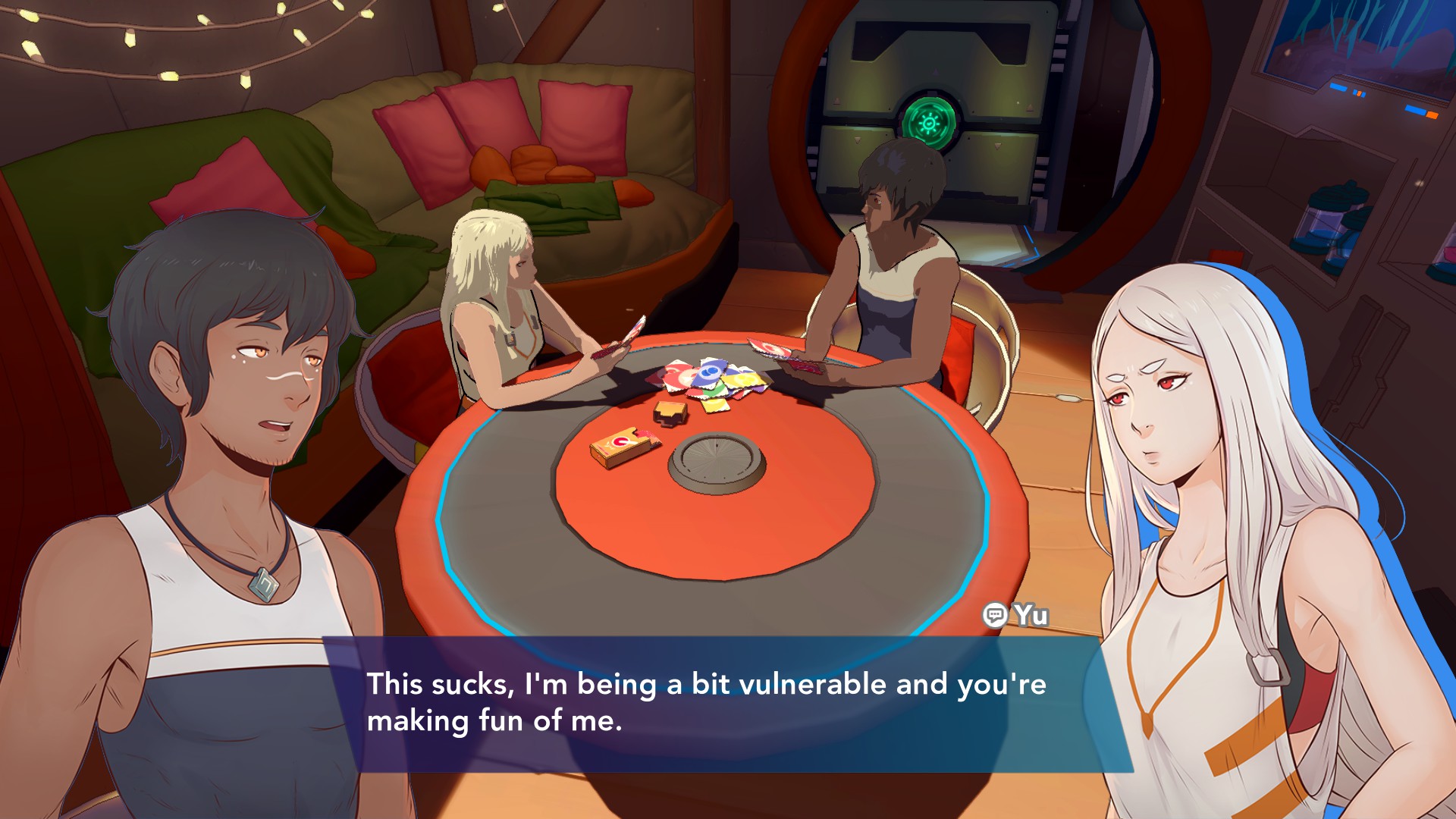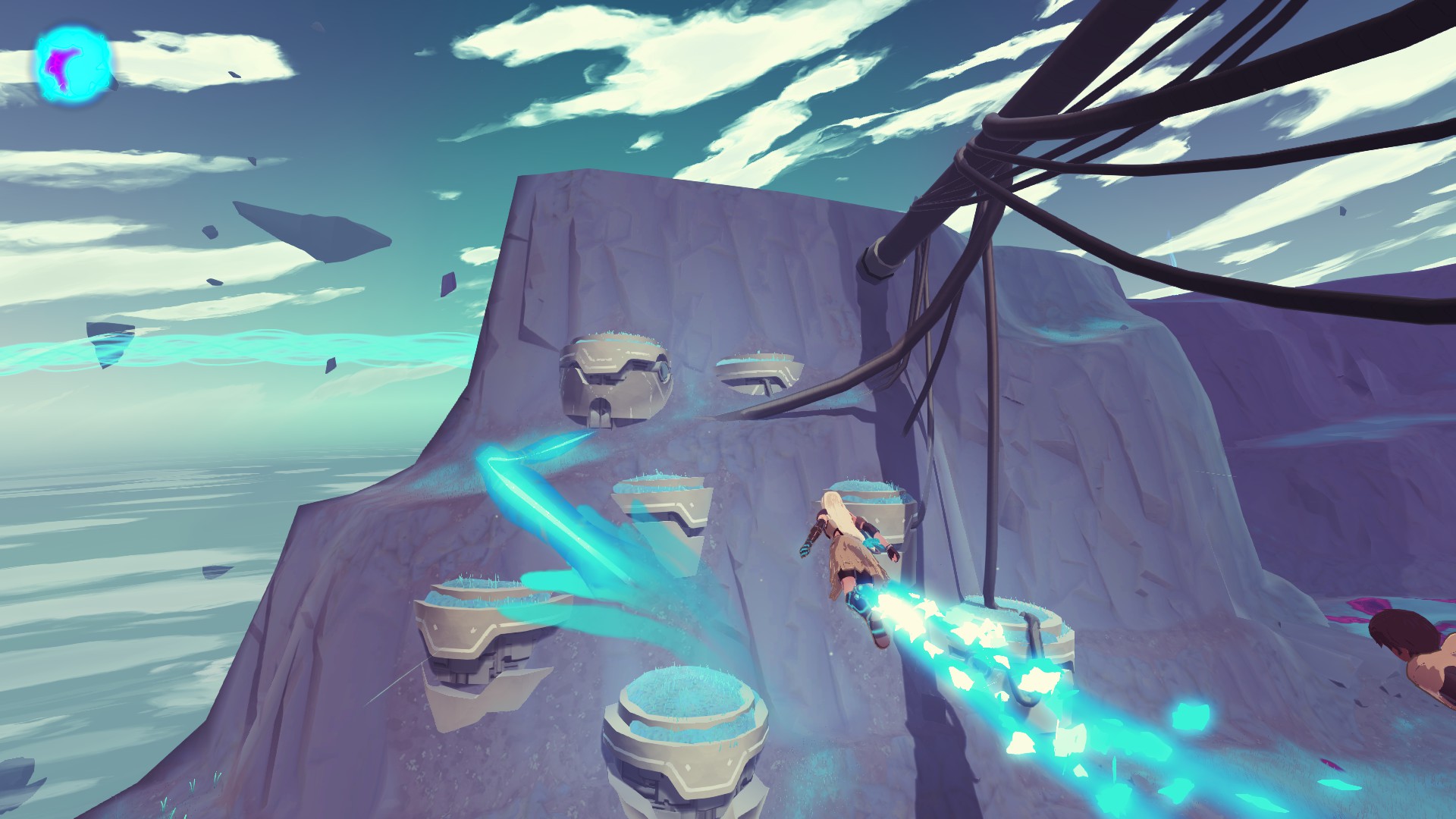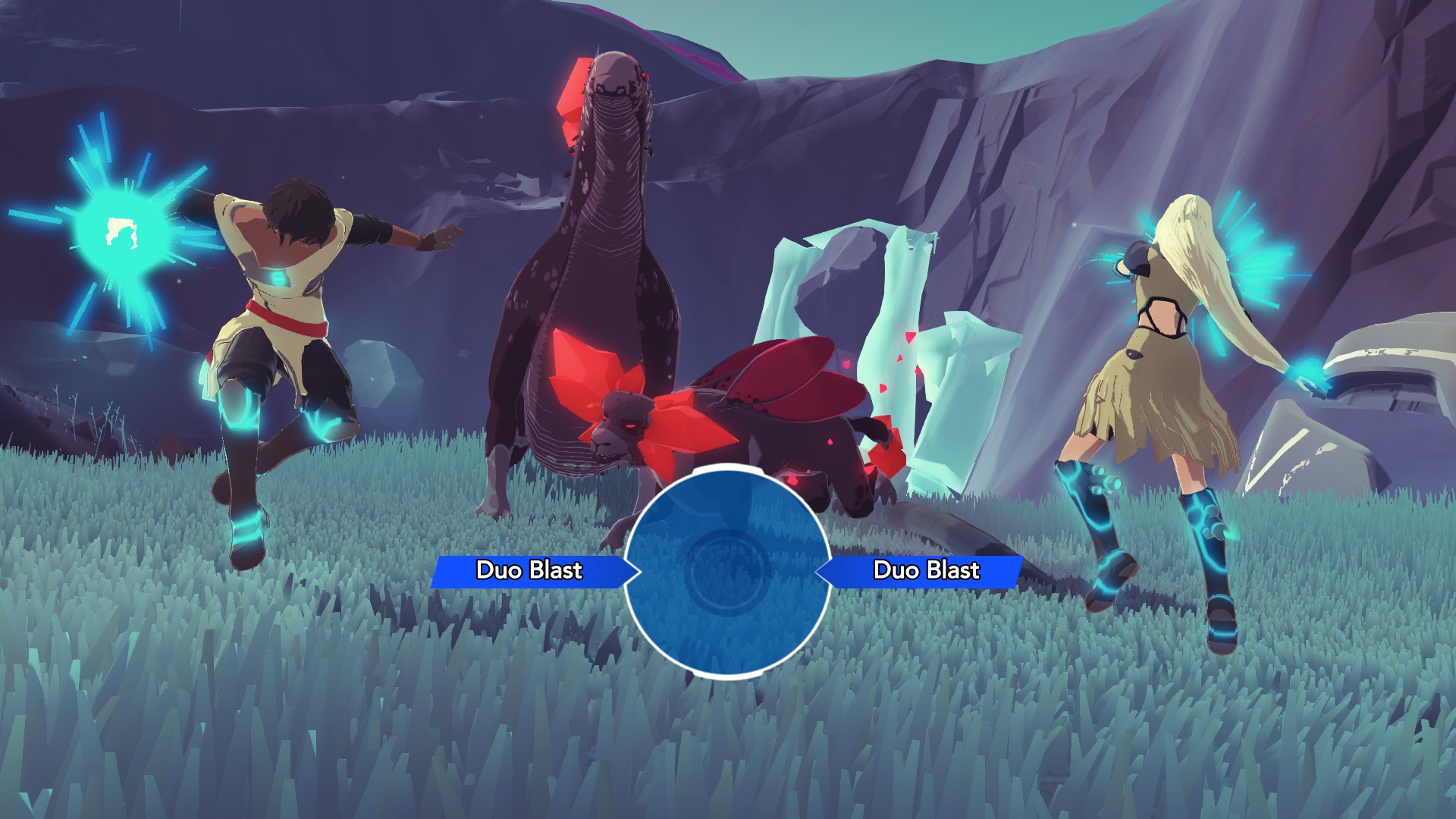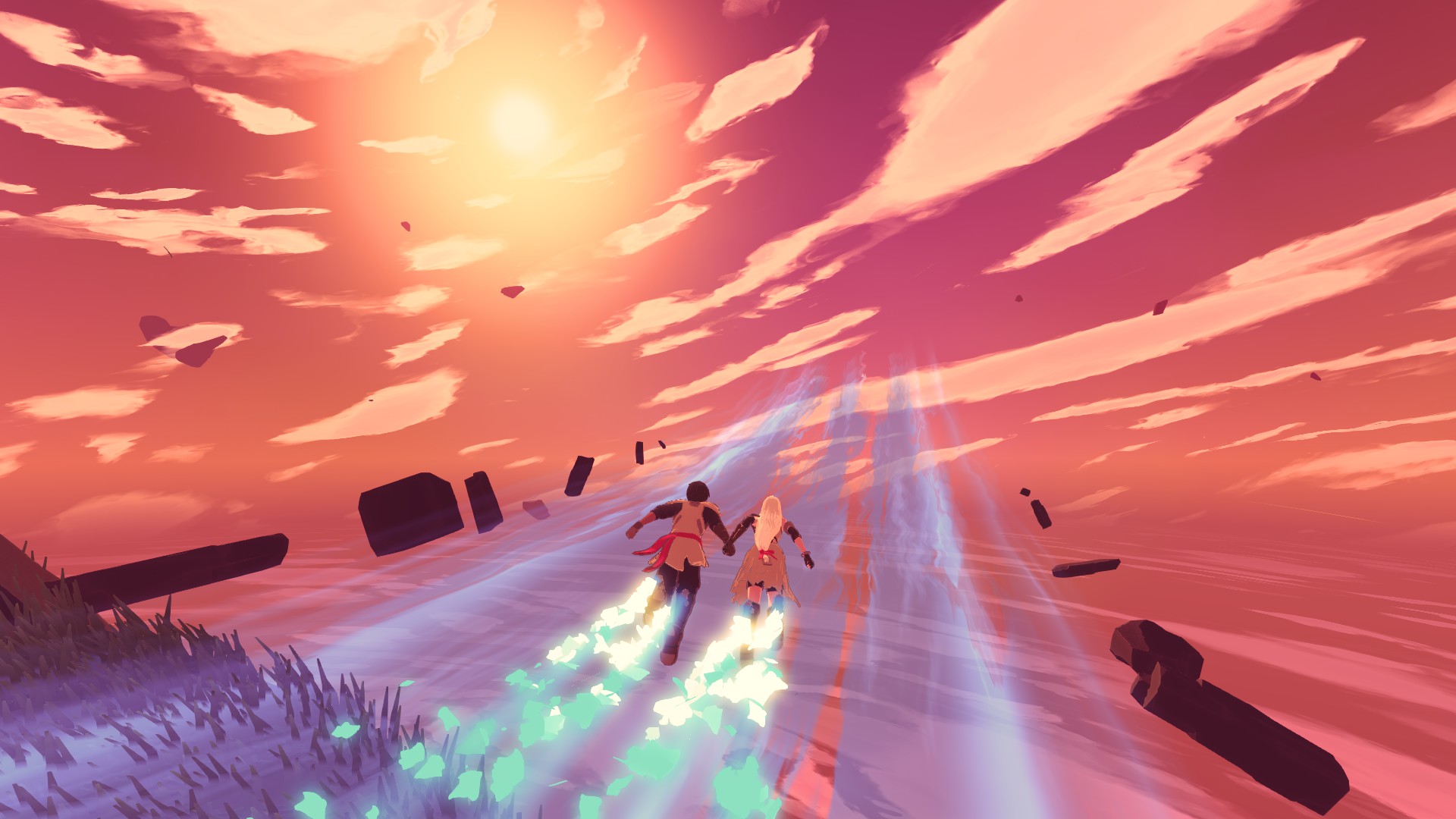Kay and Yu, a couple destined for a lifetime of Abbott and Costello routines, have fled a society that does not approve of their relationship, and hidden themselves away on Source, a floating archipelago that vaguely forms a planet. The End. Oh no!
Things, as things are wont to do, go awry. A minor earthquake tips their parked spaceship home off a cliff, but on the upside it also opens up some energy bridges to other parts of Source, allowing Kay and Yu to explore and look for a solution. I don’t think it will surprise anyone to learn that eventually their old life comes looking for them too, but for quite some time, Haven is mostly about them getting by in their new life, which largely consists of gathering alien plants and skate-gliding along ‘flow threads’; space ley lines that generate energy somehow, and power everything in the space future. It’s nice. It’s lowercase nice. I hesitate to reduce it to ‘cute couples being cute’, but the fact is if you find that idea repulsive, nothing else this game does will outweigh that for you. It is very much about a lovey couple. But right away, I appreciated that when they’re sickly sweet with each other, they do it in that self-aware way just about every intimately involved couple do. You know that tone, where you’re expressing a sentiment that’s so hackneyed you can’t possibly just say it, even though it’s entirely true. No, you have to say it in that voice that adds “I know what a cheesy, clichéd thing I am saying but I am both bold enough to say it anyway and cowardly enough to wrap it in a joke”. Pop culture has made everything an echo and sincere expression has become intolerable. The true haven is not this island but this language we share. But anyway.
Yu and Kay, a couple who form an independence party, are convincing. Games, and frankly most most media explicitly about ‘romance’, rarely do anything for me, but despite its sci fi setting and later high-stakes drama, Haven’s romance is grounded in regular couple things like cooking, cleaning the house, and deliberately annoying each other. Lounging around in bed works much the same way even if there’s a spaceship around it. These quiet scenes take up much of the first act of the game. There were enough lingering questions and doubts about the future to pull me by the curiosity through the early hours of exploration and collecting, and the couple’s casual ways of talking, flirting, and winding each other up fill in the spaces comfortably. The exposition was pretty smoothly worked in too, outlining loosely at first, and gradually filling in the details of their back story, and the context of their exile, through their mundane chats rather than having them manufacture drama out of it. A lesser game would have them sit around talking about nothing else but when the plot’s going to come and find them. Of course we know it will, but their focus on making a life together and trying not to think about it makes them feel authentic.
It has a problem though. By the time the plot proper began to kick off, I was already tired of the rest of it. Exploring Source is, some clunky keyboard controls aside (particularly the lack of any camera controls when you’re moving at speed, which the devs have said will be addressed by release), a delight at first. You slide around the pretty islets, befriending alien wildlife and exchanging frequent but not bothersome chatter, picking occasional plants, and seeking out bridges to new lands. Most are afflicted by ‘rust’, a suspicious but useful substance you gather, but which also causes animals to attack. You put these attacks down together by firing off energy bolts, shields, or plain bashing them, before using your ‘pacify’ skill to purge the corruption and restore the beasties to their harmless, cheerful meandering. I’m sure there’s a specific game universally recognised as the standard reference point for this kind of combat, but I haven’t played it, so you’ll have to make do. Fights happen in real time, but enemies attack on an unseen timer, while you hold keyboard buttons or (very much recommended) controller thumbsticks to charge up your own attacks. It’s… okay. I prefer it to faffing around in the usual godawful turn-based JRPG menus, and the animations and variety of enemies are solid enough. I liked teaming up for power attacks, but the unusual controls never quite etched into my muscle memory. Most of all though, it plain gets old. The combat and exploration aren’t varied or rewarding enough in themselves to fill the space that the story’s pace leaves. Gathering food and clearing out five or six islets of rust was pleasant and pretty. Entering a tenth one, however, became a chore. By the time I’d reached the twentieth, very similar-looking area, I had stopped bothering to collect anything, and was actively dreading the next obstacle between me and the next bit of the plot. It doesn’t help that you can only eat, sleep, and even heal at specific camping spots, which most areas don’t have. Although Haven is, by design, not a hard game, you will take fight regularly when exploring new areas, taking at least some damage each time. You’ll also need to find several special items to repair your ship/home, both of which mean heading home, or to the nearest camp site, to install things, or cook and eat, or sleep, heal, or all of the above. There’ll often be more conversations, at least, but there’ll also be the trip back, probably back through the same islands again just to get back to where you were. It’s possible to craft healing pills that you can chug anywhere, but it takes several for a full heal, and you make both them and special power attack items using rust, and they started becoming important at around the time I was already looking for excuses not to scour yet another area for the stuff.
This might be mitigated by simply playing it in shorter sessions, to be fair. And though Haven isn’t a full-on RPG, it has an obvious JRPG influence, the pacing of which is one reason I very rarely enjoy them. These are not fatal problems, is what I’m saying, and I suspect I’m being a little harsher than you might. And to its credit, at its worst I wasn’t wishing I could just stop playing (my alt-F4 reflex is powerful enough that it will probably kick in when I’m about to die irl), but that I could skip ahead to the next story bit. The game does actually unlock several shortcuts and limited fast travel systems as you progress, but they took too long to show up, and still involved a bit too much faffing around. But when that plot stuff did happen, it was compelling, and more nuanced than I’d expected. You generally won’t go wrong often in games by assuming that the baddies are bad because of badness, and that the only reason to agree with them is because you feel like seeing if there’s an evil ending. But I was pleasantly surprised when Kay and Yu inevitably made contact with their supposed oppressors. Enough so that I’m carefully edging around anything that will give too much away, but the first perspective you hear on the whole situation from someone outside the protagonists’ little bubble world is a believable one.
It’s natural to assume from the opening that the two are fleeing a monstrous totalitarian state (their early references to ‘the Matchmaker’ even reminded me of the Party’s deliberately ghastly arranged couplings from Nineteen Eighty-Four), but it seems the reality is somewhat less stark. The society they left might not exactly be right, but nor is it particularly persecuting them. Their situation in fact places them more in classic “fleeing the unwanted suitor” romance novel territory rather than “heroes overthrow the empire”, and I can respect that. But is it enough? I don’t think it quite is. It’s an awkward dilemma. Cutting out the parts that became tedious would quicken the narrative enough to undermine it, but those parts became so laborious that they dragged it down instead. Perhaps I missed the point entirely by playing it alone - it is eminently obvious where a second player would fit in to its design - but if I had a lover here right now, I don’t think this is the game I’d choose to play with them. I’ve been in my own haven for far too long.



